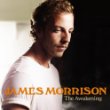It’s tough when the novelty of something special begins to fade. Such is the case of James Morrison’s ability to mimic the tonal wealth of ‘60s era Stevie Wonder, but none of the creative vision that broke Wonder out of the Motown safety machine and into a near 20-year run of back-to-back timeless releases unmatched since. Morrison’s voice is still present and able, but it isn’t enough to impress anymore, not enough to ignore the banality of the soul pop confections that comprise the third set of Morrison’s still relatively young career. The Awakening somehow manages to only awaken listeners to the possibility of Morrison being a very competent one-trick pony.
It’s tough when the novelty of something special begins to fade. Such is the case of James Morrison’s ability to mimic the tonal wealth of ‘60s era Stevie Wonder, but none of the creative vision that broke Wonder out of the Motown safety machine and into a near 20-year run of back-to-back timeless releases unmatched since. Morrison’s voice is still present and able, but it isn’t enough to impress anymore, not enough to ignore the banality of the soul pop confections that comprise the third set of Morrison’s still relatively young career. The Awakening somehow manages to only awaken listeners to the possibility of Morrison being a very competent one-trick pony.
The album was released two months ago and was certified gold in the UK just two weeks after its drop date. Part of the reason for our delayed review is that the album manages to say a lot and still little at all; safely middle-of-the-road hardly inspires the critic’s pen. Technically proficient down the line with a powerful emotional backstory—the album was written in the wake of Morrison’s alcoholic father’s death, and yet oddly the set lacks heart. Throughout, there is something muted but raw that reaches the ear but manages to somehow never move past the drum to the soul. With so much evident in Morrison’s timbre and industriousness, it’s frustrating to have such clear talent not actualize its long articulated promise. And, two out of three strikes—or albums—into this career, one begins to question whether that is all Morrison's talent will be, artistic promise unfulfilled.
Morrison came close on his last album, Songs for You, Truth for Me, with flashes of genius like “Once When I Was Little” and “Fix the World Up For You,” and, of course, there was the hope wrapped up in his “You Bring Me Something” and “Wonderful World” introduction from Undiscovered. But, none of them hit the way Morrison’s international Top Ten pop duet with Nelly Furtado, “Broken Strings” did, and Morrison reportedly was determined to hit soul hard again this go round. A new producer, Bernard Butler, was brought on to produce the majority of the 13 studio tracks, not counting the additional seven live and acoustic tracks provided on this iTunes version (“Broken Strings” producer Mark Taylor, tackles three tracks). Together they provide safe, pleasant material that approximates soul but never quite scratches the itch. Even powerhouse Jessie J on the tepid indigo pop “Up” can’t save it.
It’s hard to nail why. “Say Something Now” includes the prerequisite blue-eyed soul howling wails that should penetrate, but don’t. “Right By Your Side” has moments that get close, but then the hokum interrupts its spare beauty with a moaning chorus that screams soul-by-numbers. The song that breaks through is the organ-tinged single, “I Won’t Let You Go,” a song that approaches classic status in that it feels like a cover, that has always been part of the cultural DNA, but isn’t. The latter borrows from the early ‘70s soul vault, but nowhere near as obviously as other cuts.
The close-but-no-cigar, “In My Dreams” personifies a Morrison song, comfortable in its Hitsville USA pilfering but also sound in its skillfully relaxed delivery. “The Person I Should Have Been,” in chords and vocal approach on the chorus, references the Talking Book years of Wonder, but the unmotivated arrangement, swelling gospel closing, and watered-down lead only highlight what it is not, not what it’s trying to be. It’s best not to mention the clunky “Beautiful Life,” with its too familiar horn chart, all-girl backing chorus and rote bridge—all of which we need never hear again. The wall of sound, Motown back-beating “Forever” follows another threadbare path, but it at least boasts an energy sorely lacking in most of this set. The melodic and lyrically compelling “The Awakening” might have packed more punch with a bit more pruning to more directly get at the core of a sincerity buried under its ‘60s rock production.
These songs are meant for the closing credits of a romantic comedy, as people are walking out the theater still needing something pleasant to hum. All well-produced, decently sung and utterly forgettable soul pop rooted in the past but bringing nothing new to sounds or the legacy of its artist. Mildly Recommended.
By L. Michael Gipson

